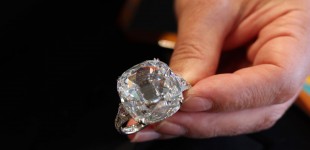As Japan tried to revive economy in northeastern area after devastating tsunami and earthquake, winery is considered a good solution. Winery is pioneered in Miyagi prefecture to boost economy in disaster zone.
fukushima
Japan should aim to make nuclear energy account for between 20 and 22 percent of the country's electricity mix by 2030, with renewable energy making up slightly more, the industry ministry said on Tuesday.
One by one, Japan is turning off the lights at the giant oil-fired power plants that propelled it to the ranks of the world's top industrialized nations. With nuclear power in the doldrums after the Fukushima disaster, it's solar energy that is becoming the alternative.
The bill for shutting down Germany's nuclear power plants and building a safe disposal site for nuclear waste could rise to 70 billion euros ($75 billion), the head of a government commission told daily Frankfurter Rundschau in an interview.
As China signs global deals to export its nuclear power technology, it faces a huge obstacle: it still needs to show it can build and safely operate these reactors at home.
With shrinking prospects at home and the threat of further yen weakness, Japanese companies are rushing to buy overseas and seem willing to pay top dollar, as shown by Japan Post's $5 billion bid for Australia's Toll Holdings (TOL.AX).
Japan began deliberating its 2030 targets for power generation on Friday, a process likely to turn contentious when nuclear restarts are considered even as the much delayed cleanup at Fukushima continues four years after the meltdowns there.
Germany's newly installed onshore wind power capacity rose by a record 4,750 megawatts (MW) in 2014, industry groups said on Thursday, marking what is likely to be a peak annual gain as the country gears up for a nuclear-free future.
Japan's exports grew the most in a year in December, helped by a weak yen and a pick-up in overseas demand led by the United States, an encouraging sign for the recession-hit economy even as doubts persist about the strength of global consumption.
Once at the forefront of the fight against global warming, Japan is now facing calls from other big economies such as China to set fresh emissions targets as Tokyo increases its use of dirty coal energy to replace nuclear.
When Prime Minister Shinzo Abe raised Japan's sales tax from April, he was betting he could break a jinx that has doomed leaders who raised the levy to losing their jobs.
Japan's new trade and industry minister received contributions from a firm in which foreign investors held a majority stake, but was not aware of the possible violation of the political funds law at the time and has returned the money, an aide said on Monday.
After the Fukushima disaster crippled Japan's nuclear energy sector three years ago, the government pledged the biggest shake up in the history of the fragmented electricity industry to boost competition and contain a surge in power prices.
The Japanese government will shoulder the decontamination costs from the 2011 Fukushima nuclear disaster through the sale of its shares in Tokyo Electric Power Co. Decontamination costs are estimated to reach ¥2.5 trillion.
An earthquake with a magnitude of 7.3 hit Japan's east coast early Saturday morning but no immediate land damage was reported.
Subscribe to VCpost newsletter
Most Popular
- Nestle Cuts Sales Forecast as Shoppers Reject Price Hikes
- Social Security Payments Worth Over $4,800 To Go Out This Week; Here’s When You’ll Get Yours
- US Could See Another ‘Great Resignation’ as 3 in 10 Workers Plan To Quit in 2024: Survey
- Uber, Lyft Drivers Remain as Contractors After California Supreme Court Upheld Proposition 22
- Maersk Agrees to Settlement with US Labor Department After Firing Whistleblower
- Walmart Eyes $200 Million Investment in Autonomous Forklifts
- Delta’s CEO Flew to Paris for the Olympics While His Company Is Under Federal Investigation: Report
- Murdoch Empire Family Feud Could Upend the Media Industry, Possibly End Fox News


